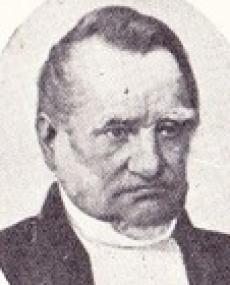
Abraham Faure was born on 29 August 1795 in Stellenbosch. Faure was one of the leading personalities of his tune in church and intellectual circles at the Cape. As a preacher he was famous for his impressive style and delivery; as a person he was serious, conscientious and strict. He was also renowned for his capacity for work, his methodicalness, his wide contacts in the highest circles, and for the versatility, integrity and will-power which enabled him to undertake so many activities in spite of having poor health for 35 years. He was educated at Gosport in England under Dr. Bogue (1814-16) during a revival of religious and missionary zeal, and at Utrecht in the Netherlands (1816-18), which gave him a strict Calvinist background. Having been inducted as Dutch Reformed minister at Graaff-Reinet in 1818, he was called to the Groote Kerk in Cape Town in 1822. Here he was the moving spirit behind the convocation of the first synod (1824), was a member of the church executive (Moderatuur) for 43 years, first as Secretary and then as Registrar of the Synod, and was at the same time Church archivist and administrator. He pleaded for a second church building in Cape Town - a matter which led to grave discord in the congregation, with the result that a special synod had to be called in 1837.
Faure has been called 'the father of South African literature', because he made the first organised effort to promote literature in the country. As early as 1831 he founded the Zuid-Afrikaansch Tractaat en Boek Genootschap.His writings were chiefly of a religious-ethical and historical nature, and he was a leading spirit in the Church's struggle for the preservation of the culture of the Dutch-speaking colonists. He was founder, editor and publisher of the monthly journal Het Nederduitsch Zuid-AfriÂkaansch Tijdschrift (1824-43), of the first church magazine, De Honigbij (1838-46), and of De Gereformeerde Kerkbode, which he edited for twenty years and which is now, as Die Kerkbode, the official organ of the N.G. Kerk. In collaboration with N.J. Hofmeyr and John Murray he founded the Zuid-Afrikaansche Christelijke Boeken Vereeniging in 1853.
As educationist he was the founder of the Zuid-Afrikaansch AtheÂnaeum in Cape Town (1829), lecturer in classical languages, and founder of Sunday-schools in his church (1844). He also worked for the establishment of the first training-college for teachers (1849). He took the lead in the celebration of the second centenary of the founding of the colony.
The culmination of his life-work was the opening of the Theological Seminary at Stellenbosch (1859), in which he had taken the initiative. Rutgers University in New Brunswick, N.J., conferred on him a doctor's degree honoris causa in 1862, and he retired five years later. Faure died on 28 March 1875 in Cape Town.